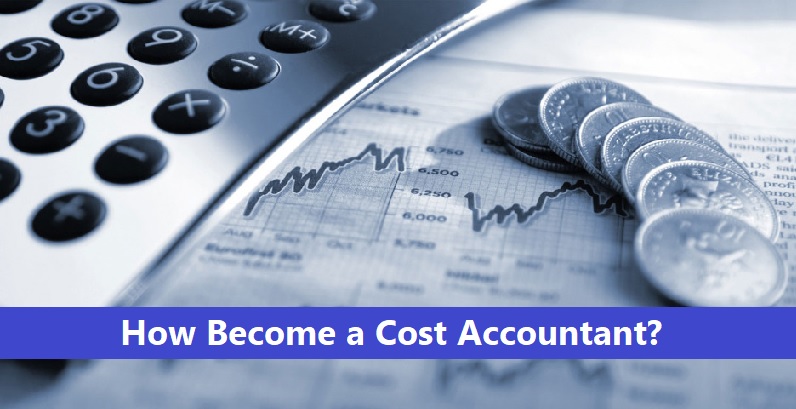How to Become a Cost Accountant in 2023: Salary, Required Skills, Training

According to the IBEF, the number of job openings for cost accountants would rise by 6 percent, creating 90,000 new positions between 2018 and 2028. Cost accountants are paid around INR 40,00,000 per year over the world, according to their statement.
The CMA Foundation, Intermediate, and Finals courses all have three levels. The training might last anything from eight months to a year and a half. To pass this course, students must finish a 100-hour training program.
It costs an average of INR 4000 to take the Foundation course, INR 20,000 to take Intermediate, and INR 17,000 to take CMA Final. CTOs, Treasurers, CFOs, Controllers, Vice Presidents, Finance Managers, Senior Accountants, and Cost Accountants are all examples of cost accounting titles.
Required Skills to Become a Cost Accountant in 2023
- Cost accountants assist managers in making well-informed decisions by analyzing financial documentation and performance reviews. These accountants assist in reducing expenses, increasing margins, and enhancing profitability.
- Analytical skills are required for many accounting roles, especially those in cost accounting. Cost accountants are responsible for acquiring and analyzing financial data and offering suggestions to the company’s executives.
- Budgets, financial reports, accounting records, business operations, and market trends must be thoroughly analyzed by cost accountants before they can make recommendations for cost-cutting strategies.
- It is imperative that cost accountants communicate their findings to their colleagues and superiors in a clear and concise manner. These experts can’t accomplish their jobs effectively unless they have excellent communication abilities, both verbally and in writing.
- With the use of numerous software programs, cost accountants may evaluate and arrange financial data. Many cost accountants have a strong background in financial analysis, accounting, and database management systems that help them in their work.
- Excellent arithmetic abilities are also required for successful careers as cost accountants. Cost accountants, on the other hand, must be able to examine and compare numbers.
Types of Cost Accountant
Cost accountants can expect to find work in the following positions after finishing all levels of the profession.
The Cost Accountant
Analyzes and creates final papers for a Cost Accountant. They even specialize in handling the financial parts of a firm. In the field of cost accounting, supply chain management and profitability analysis are common interests.
Check how to become a food inspector
Chief Financial Officer
Financial planning, risk management, record-keeping, and reporting are all responsibilities that fall within the purview of a company’s chief financial officer. The CFO is also in charge of the company’s data analysis.
Financial Analyst
In addition to financial institutions like banks and pension funds, financial analysts can also work for insurance firms and other similar organizations. Businesses and individuals seek the advice of financial analysts on the best ways to spend their money in order to maximize earnings.
Finance Manager
Budgeting and financial counseling are two of the responsibilities of a Finance Manager, who is paid an annual salary of INR 5,00,000 (about $7,000).
Financial Risk Manager
Identifying potential threats to a company’s assets, earnings potential, or achievements is the goal of a financial risk manager. Maintaining the company’s risk is his primary responsibility, which will safeguard your business.
Cost Accountant Training: A Step-by-Step Guide
Finance and business majors and minors are particularly well-suited for work in cost accounting because of the variety of job opportunities available. Those who are interested in a career in which they may have a direct impact on corporate strategy can discover what it takes to become a cost accountant by researching the education, training, and experience requirements.
Get a Bachelor’s Degree
A bachelor’s degree in accounting or finance is required for cost accountants. A cost accountant’s education should begin with a degree in accounting or a related business field. Computer applications, economics, corporate law, marketing, and management are among the topics covered in accounting degrees.
As a part of their courses, students learn about accounting principles, computer applications, and information systems as well as advanced management accounting concepts. They will be well-equipped to enter the profession of accounting and finance, including the potentially lucrative sector of cost accounting, with a bachelor’s degree.
Hands-on experience
Most organizations prefer individuals having at least three years of experience in accounting in addition to a bachelor’s degree. As a result of this on-the-job training, candidates are able to put into practice the principles they learned in business and finance class.
Equip yourself with important certifications
Many professionals in the sector choose to obtain certifications as part of their training in order to demonstrate their expertise even further. Many bigger corporations prefer to engage certified public accountants (CPAs), even though they are not required to do so by law.
Check how to become a train driver
As a result, anyone hoping to increase the diversity of their career alternatives should consider getting their driver’s license. Applicants for licensure must pass the Uniform CPA Exam and complete 150 credit hours of accounting, finance, and business courses. In addition, two years of work experience is commonly required in most jurisdictions.
Advance Your Career with a Master’s Degree
With an online master’s degree in accounting, a cost accountant has a leg up on the competition, especially when looking for management accounting employment. These programs train students in advanced managerial skills and knowledge, as well as strategic accounting and auditing methodologies. Master’s degrees are encouraged, even if they aren’t necessary, for those who want more responsibility in the profession and higher pay.
Master’s degree programs in accounting often cover advanced business, financial, and accounting issues. Financial reporting, data analytics, accounting laws, and corporate governance are examples of possible areas of concentration.
Companies looking to fill high-level cost accountant roles can benefit from this postgraduate training by developing the business acumen and financial competence required.
Professional Resources for Certifications
Institute of Management Accountants
More than 100,000 management accountants throughout the world are members of the Institute of Management Accountants (IMA). Resources for professional growth are available via the organization, including certificates, seminars, a job board, and payment data.
American Institute of Certified Professional Accountants
The American Institute of Certified Public Accountants (AICPA) has more than 429,000 members. There is a wealth of knowledge available through the association’s continuing education, publications, and specialist certifications, including information on the CPA certification process.
American Management Association
Certificate programs and continuing education options offered by the American Management AssociationAMA are designed to assist managers to acquire new skills. It is possible for cost accountants to take classes offered by the American Management Association (AMA).
Society of Cost Management
SCM was founded in 2010 and provides a job marketplace, best practices, and ethics materials for cost management experts. Resources and training opportunities are made available to members.
National Society of Accountants
The National Society of Accountants (NSA) offers tax and accounting professionals both on-site and online education. The organization provides access to a variety of industry periodicals and accounting information.
In India, How Do You Become A Cost Accountant?
Organizations have varying ideas about what Cost Accountants do, but in general, they are responsible for keeping tabs on the company’s finances. Operational and buying expenses are included in the organization’s budget.
The Preparation Done in the Elementary and Secondary Schools
If a high school student wants to become a cost accountant, they can take any course they choose, except fine arts. It isn’t necessary to take the entrance exam in either mathematics or accounting. However, if you choose to study mathematics and accounting, it will be much easier for you to pass your CMA exam and your admission exams.
Undergraduate preparation
Upon completing your 10+2 and passing the admission exam, you’re ready to begin the course. If you have a bachelor’s degree, you may apply directly to CMA Intermediate, but if you don’t have a bachelor’s degree, you can begin at the CMA Foundation level. In order to complete the CMA programme, the length of time it takes is influenced on the degree of study you choose to pursue
Cost Accountant Training Programs
The Institute of Cost Accountants of India awards the prestigious certification of Cost & Management Accountant or Cost Accountant. The Institute of Cost Management Accountants, formerly known as the Institute of Cost and Works Accountants of India, is now more commonly recognized. ICWA and CMA have no technical differences.
Salary Information for Cost Accountants
Depending on one’s degree and experience, cost accountants can earn anywhere from $30,000 to more than $100,000 per year, but the job offers many opportunities for success. In 2018, the Bureau of Labor Statistics (BLS) stated that professional accountants earned median annual pay of $70,500.
A career in cost accounting is not included in this information. Cost accountant wages, according to PayScale, range from about $43,000 to $76,000 per year. In addition, it shows that wages rise in tandem with years of expertise.
Career Prospectus
It is projected that accounting experts would be in high demand as technology and globalization continue to change the way businesses operate. The Bureau of Labor Statistics (BLS) predicts that the field will expand by 6% between 2018 and 2028. This means that corporations will need to hire an additional 90,700 accountants by the year 2028.
Accountants’ fundamental responsibilities may change over time when new technologies develop that automate many of their everyday operations. As a result, the BLS believes that this transition will increase efficiency and concentrate their attention to more significant responsibilities requiring analysis and advisory activities.




